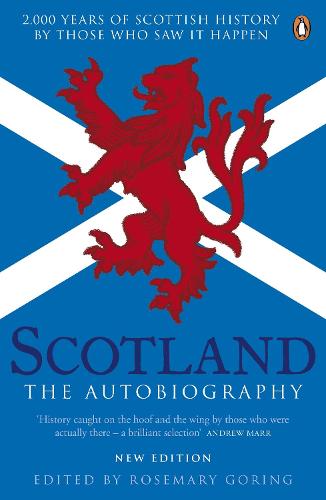A fresh take on Scottish history taking the reader from circa AD 80 to the late 1990s. In the introduction Goring (the books editor) states Scottish history is so much more than William Wallace, Mary Queen of Scots and Bonnie Prince Charlie and then spends 400 pages proving exactly that.
The book covers everything from how the Scots make haggis to schooldays in 1560s right up to significant modern events such as the Lockerbie disaster and Princess Diana's death. Delivered in short sharp snippets with sometimes only the briefest of introductory sentence the book was easy to read unlike so many other historical nonfiction books.
The diary entries, newspaper articles and interviews give unique insight into day to day life and despite their brevity I do feel like I have come out of the other side more knowledgeable. Unlike some books where I have trudged through 600 pages to be be none the wiser as I was so bogged down in names, dates and detail the book delivers the point then moves on to an entirely different subject matter without thought to rounding off the picture or setting the scene.
There were some really informative startling pieces such as the sinking of the German navy, some pieces I could personally relate to such as the Eyemouth fishing disaster (we literally went their last weekend and saw the monument for the first time) as well as some pieces centering around things that everyone would have heard - Peter Pan, the Edinburgh Fringe Festival, the Olympics, Trainspotting and the Loch Ness Monster! Where else can you find all of these in the same book? The book also was hard hitting in places, I found the force feeding of the suffragettes difficult to read and Fordyce Maxwell's Dunblaine Massacre piece heartbreaking.
My only criticism is I would have liked more background to some of the pieces. For example did the Jacobite who escaped from the Tower of London survive? This isn't a major criticism as that was the point of the book, here are the salient points now take what interests you and go read further. The book was a brilliant tool to use as a spring board and the accompanying bibliography and appendix certainly give good starting points for further reading.
I thoroughly recommend this book for anyone who has half an interest in Scotland or history generally. It's well put together, easy to read and there is something in there for everyone. If you are new to historical nonfiction this makes an excellent starter for ten. #stayingontheshelf
The book covers everything from how the Scots make haggis to schooldays in 1560s right up to significant modern events such as the Lockerbie disaster and Princess Diana's death. Delivered in short sharp snippets with sometimes only the briefest of introductory sentence the book was easy to read unlike so many other historical nonfiction books.
The diary entries, newspaper articles and interviews give unique insight into day to day life and despite their brevity I do feel like I have come out of the other side more knowledgeable. Unlike some books where I have trudged through 600 pages to be be none the wiser as I was so bogged down in names, dates and detail the book delivers the point then moves on to an entirely different subject matter without thought to rounding off the picture or setting the scene.
There were some really informative startling pieces such as the sinking of the German navy, some pieces I could personally relate to such as the Eyemouth fishing disaster (we literally went their last weekend and saw the monument for the first time) as well as some pieces centering around things that everyone would have heard - Peter Pan, the Edinburgh Fringe Festival, the Olympics, Trainspotting and the Loch Ness Monster! Where else can you find all of these in the same book? The book also was hard hitting in places, I found the force feeding of the suffragettes difficult to read and Fordyce Maxwell's Dunblaine Massacre piece heartbreaking.
My only criticism is I would have liked more background to some of the pieces. For example did the Jacobite who escaped from the Tower of London survive? This isn't a major criticism as that was the point of the book, here are the salient points now take what interests you and go read further. The book was a brilliant tool to use as a spring board and the accompanying bibliography and appendix certainly give good starting points for further reading.
I thoroughly recommend this book for anyone who has half an interest in Scotland or history generally. It's well put together, easy to read and there is something in there for everyone. If you are new to historical nonfiction this makes an excellent starter for ten. #stayingontheshelf

Comments
Post a Comment